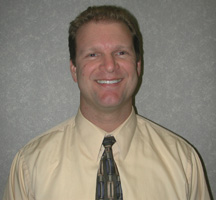 As Brett Kuhn, Ph.D., watches the days grow longer, he also sees an increased number of children with spring-related insufficient sleep.
As Brett Kuhn, Ph.D., watches the days grow longer, he also sees an increased number of children with spring-related insufficient sleep.
“Kids don’t get into bed as early, because the weather’s nicer, it’s light out later and there’s more time to be outdoors doing things” said Dr. Kuhn, a psychologist and associate professor of pediatrics at UNMC. “When spring arrives, it’s more difficult to get kids in on time, to bed on time and to sleep on time, yet they still have school.”
Dr. Kuhn wasn’t surprised by a recent national study that found America’s children are sleeping less than experts recommend, while more than two-thirds experience frequent sleep problems. The National Sleep Foundation’s 2004 Sleep in America poll also found that many parents and caregivers do not realize their children are not getting the right amount of sleep.
“Most parents think of nutrition, diet and exercise, but they also need to make their child’s sleep a priority,” said Dr. Kuhn, who founded the Pediatric Sleep clinic at UNMC’s Munroe-Meyer Institute in 1995.
The poll, the first ever to examine children’s sleep habits, highlights National Sleep Awareness Week, which runs through April 4. It also coincides with the beginning of Daylight Saving Time (April 4), when we turn our clocks forward one hour and therefore risk losing an hour of sleep.
“We’re so busy, so active and so over scheduled,” Dr. Kuhn said. “The one thing that consistently gets squeezed out is sleep and we now know that sleep is critical to health and optimal functioning. For kids, its critical to their learning, memory, safety and creative problem solving.”
As a result, it’s important to recognize sleep problems and seek help if necessary, he said. Sleep deprived children actually can appear hyperactive, as well as impulsive. They also may have more difficulty concentrating, be moody, irritable and engage in temper tantrums.
The recommended amount of sleep during a 24-hour period for infants (3-11 months) is 14-15 hours; for toddlers, 12-14 hours; preschoolers, 11-13 hours; and school-aged children, 10-11 hours. The Sleep in America poll shows infants sleep 12.7 hours; toddlers, 11.7 hours; preschoolers, 10.4 hours; and school-aged children, 9.5 hours.
Dr. Kuhn said it’s important for infants to learn to initiate sleep independently. “You can promote that, teach that and make it happen by placing them in their own crib drowsy, but still awake,” he said.
The following are additional sleep tips suggested by Dr. Kuhn and the National Sleep Foundation:
- Establish regular bedtime routines and a sleep friendly environment (cool, quiet and dark room).
- Set limits that are consistent, communicated and enforced, especially for toddlers who want to make their own choices.
- Avoid the habit of “musical beds,” which disrupts quality sleep for everyone.
- Be sure your practice is consistent with your expectations.
- Keep televisions and computers out of the bedroom.
- Learn to recognize common sleep problems including difficulty falling asleep, nighttime awakenings, snoring, frequent sleep walking, sleep terrors, frequent nightmares, stalling and resisting going to bed, having trouble breathing, and loud or heavy breathing while sleeping.
Although, making sleep a priority is important, it doesn’t mean a child can’t stay up late once in awhile, Dr. Kuhn said, if a conscious decision has been made to delay bedtime for a unique experience. “An occasional late night won’t create a huge impact, instead parents should focus more on healthy sleep habits and enduring patterns.”